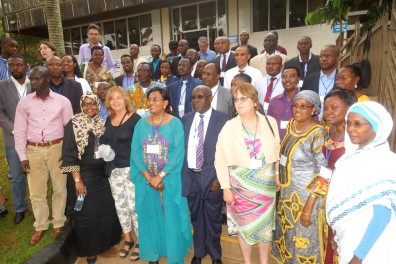The participants were people in key positions mostly from foreign affairs ministries, ministries in charge of water affairs, legislators, water regulatory and management authorities who have a role in negotiating, drafting or reforming treaties and legislations. They also have roles in planning, influencing and decision-making on transboundary waters.
One of the topics covered by the training was the importance of institutional frameworks for trans-boundary river basin management. GWP and its collaborating partners – in their efforts to increase capacity development in Africa – consider strengthening capacities of institutions of countries and basin organizations for effective transboundary water resources management vital. In their reflections, the participants recognized the need for a continued IWL training in Africa as a benchmark for enhancing knowledge and skills necessary for promoting cooperation among countries.
The training acted as an important catalyst for fostering a stronger collaboration among institutions by way of knowledge exchange through case study experience sharing across Africa.
Learning Rules and Principles
In terms of providing an understanding on the international and regional rules of transboundary water governance, the training traced the evolution of international law, examined the main rules and principles of the UN Watercourses Convention and UNECE convention, as well as regional conventions such as the SADC protocol on water, the EAC protocol on basin management etc. These provided the participants with key tools in addressing institutional and governance issues.
It further offered numerous case studies that highlighted both the experiences and challenges in implementing international water law ‘on the ground’ from river/lake basins in Africa. The participants presented case studies across Africa that brought out key issues concerning institutional building and challenges of transboundary water management.
Examples of case studies included the Shire River Basin Management Programme between Malawi and Mozambique, water resources management in Pangani basin shared by Kenya and Tanzania, transboundary relationships between Botswana and South Africa over the Molatedi dam, Akanyaru Peat Production and the Power Generation Project shared by Rwanda and Burundi. Furthermore, the participants heard about stakeholders’ participation in the Volta River Basin, and the role of research in International Cooperation of Transboundary Rivers, with a focus on the Grand Ethiopian Renaissance Dam Project.
Interactive Learning
Through a highly interactive group exercise and lively discussions, the participants became familiar with the role of IWL in the governance and management of transboundary waters, the recent trends in IWL, its main rules and principles, as well as the challenges and experiences faced in implementation across Africa.
It is recognized by regional economic communities such as IGAD, EAC, SADC and ECOWAS that the continued strengthening of technical and institutional capacities of agencies and individuals in Africa is key. The experiences and lessons learnt from this training will therefore be taken forward and used to develop a 5- year- long, (2016-2020) training programme on IWL in Africa.
The training was organized by Global Water Partnership (GWP) in collaboration with the University of Dundee (UK), Makerere University (Uganda), the Intergovernmental Authority on Development (IGAD) and African Network for Basin Organizations (ANBO).

